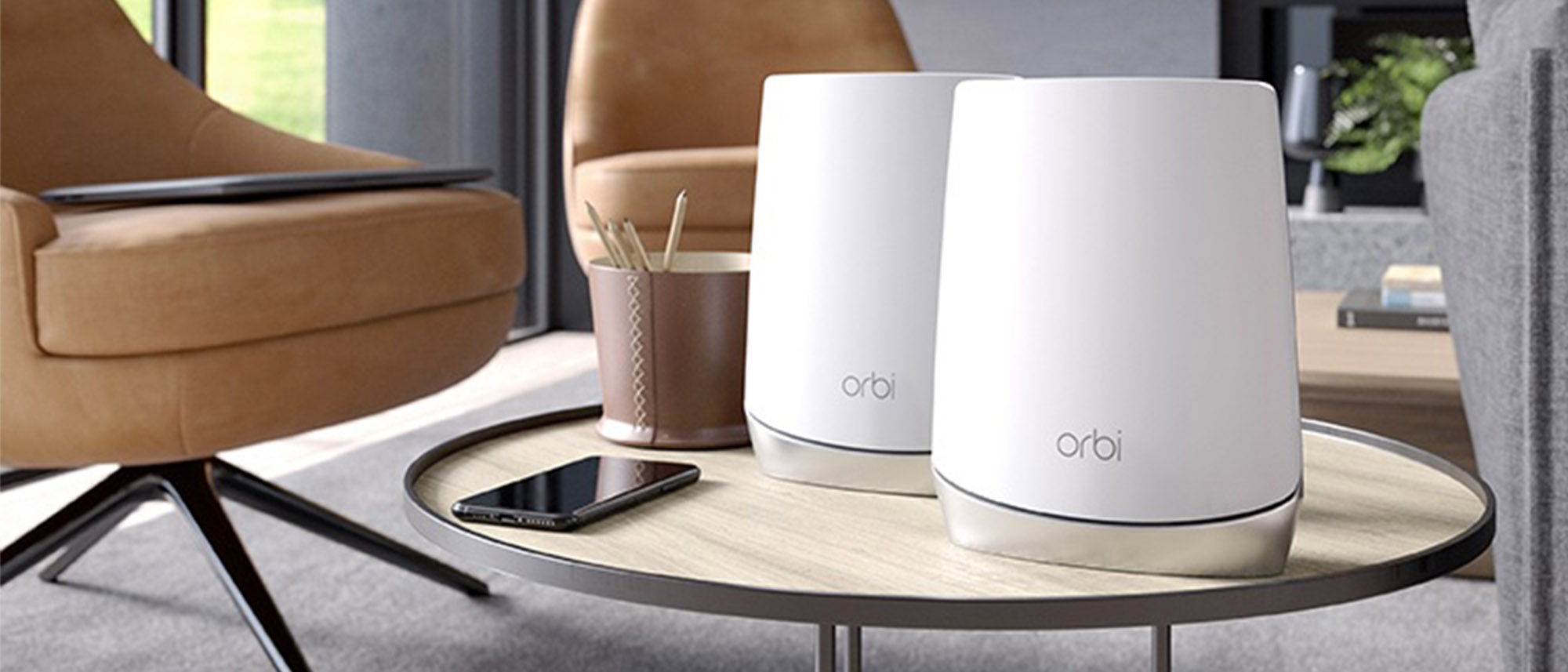Tom's Guide Verdict
The smaller cousin of Netgear’s Orbi RBK852, the Orbi RBK752 doesn’t place as much emphasis on raw performance but does manage to include an impressive array of customization options. It may represent a less expensive approach to mesh networking, but the RBK752 remains among the most expensive two piece mesh kits available.
Pros
- +
Malware protection
- +
Tri-band operation
- +
Easy setup
Cons
- -
Large
- -
90-day support policy
- -
Short range
Why you can trust Tom's Guide
Wi-Fi Spec: AX4200
Number of Antennas/Removable: 6/No
Ports: Router – 1 WAN/3 LAN; Satellite – 2 LAN
Processor/Memory/Storage: Quad-core 1.4GHz/512MB/1GB
Wi-Fi chip: Qualcomm IPQ8174
Peak 802.11ax performance: 506.7 Mbps (at 15 feet)
Range: 85 feet
Size: 9.4 x 6.5 x 2.0 inches
Estimated Annual Electricity Cost: $9.80 per unit; $19.60 for the two devices
For a more affordable way to get Wi-Fi 6 connectivity throughout your home, the Netgear Orbi RBK752 isn't just one of the best mesh routers out there, it's also a good affordable option alongside the best Wi-Fi 6 routers.
A smaller and cheaper alternative to one of the best mesh routers on the market – the Netgear Orbi RBK852 – the Netgear Orbi RBK752 kit has lower performance expectations than its older cousin. Based on Wi-Fi 6 technology, it offers a pair of data delivery bands as well as one dedicated to communications from the satellites and the host router that can streamline a mesh network’s operations. The system includes extra security software but you’ll need to pay for updates in the long term. All in all, our Netgear Orbi RBK752 review shows that this mesh kit has the power to fill a mid-sized home with Wi-Fi data. Read on to see if it’s right for your home.
Netgear Orbi RBK752 review: Pricing and availability
Available in stores and on the Netgear site, the RBK752 consists of a preset router (RBR750) and a wireless satellite device (RBS750). The basic two-piece RBK752 kit reviewed here can cover up to 5,000 square feet, according to Netgear. You can also get the three-piece RBK753 kit (with two satellites) that is rated to work with 7,500 square feet and the four-piece RBK754 set (with, you guessed it, three satellites) that can cover 10,000 square feet.
- 2-pack (Model RBK752) - $349.99
- 3-pack (Model RBK753) - $479.99
- 4-pack (Model RBK754) - $749.99
- Add-on Satellite (Model RBS750) - $229.99
A single RBS750 satellite add-on is also available, allowing you to customize the mesh network for your type of home. On the other hand, buying the big kit gives you savings of roughly 30 percent versus buying the devices separately.
Netgear Orbi RBK752 review: Design
If the Orbi RBK752 components look familiar, they should. They use the same basic oval tower design as the RBK852 family, but measure 9.4 x 6.5 x 2.0 inches. That’s 40 percent smaller than the RBK852 devices. The upshot is that despite being smaller, the RBK752 units remain some of the largest mesh products available and make ones like the Eero Pro 6 look tiny.
Still, the RBK752 devices will fit in places their larger cousins won’t. They have soft rubber feet but lack any way to wall mount the devices. Fortunately, several third parties and Netgear sell inexpensive mounting hardware for them.
The Orbi RBK752 gear uses passive cooling, with fresh air coming in from the bottom and exiting at the top. The devices never got over 95-degrees Fahrenheit.
They may look identical but under the skin one is designated as the RBR750 router and the other as the RBS750 satellite – for this review, we'll refer to them interchangeably as the Orbi RBK752 unless it's necessary to specify one or the other. Both lack the array of LED lights that many routers have these days but make do with a single LED band near the bottom to show the router’s status. It’s blue while starting up and turns white when everything is OK. If it's magenta, the unit is offline and needs some attention.
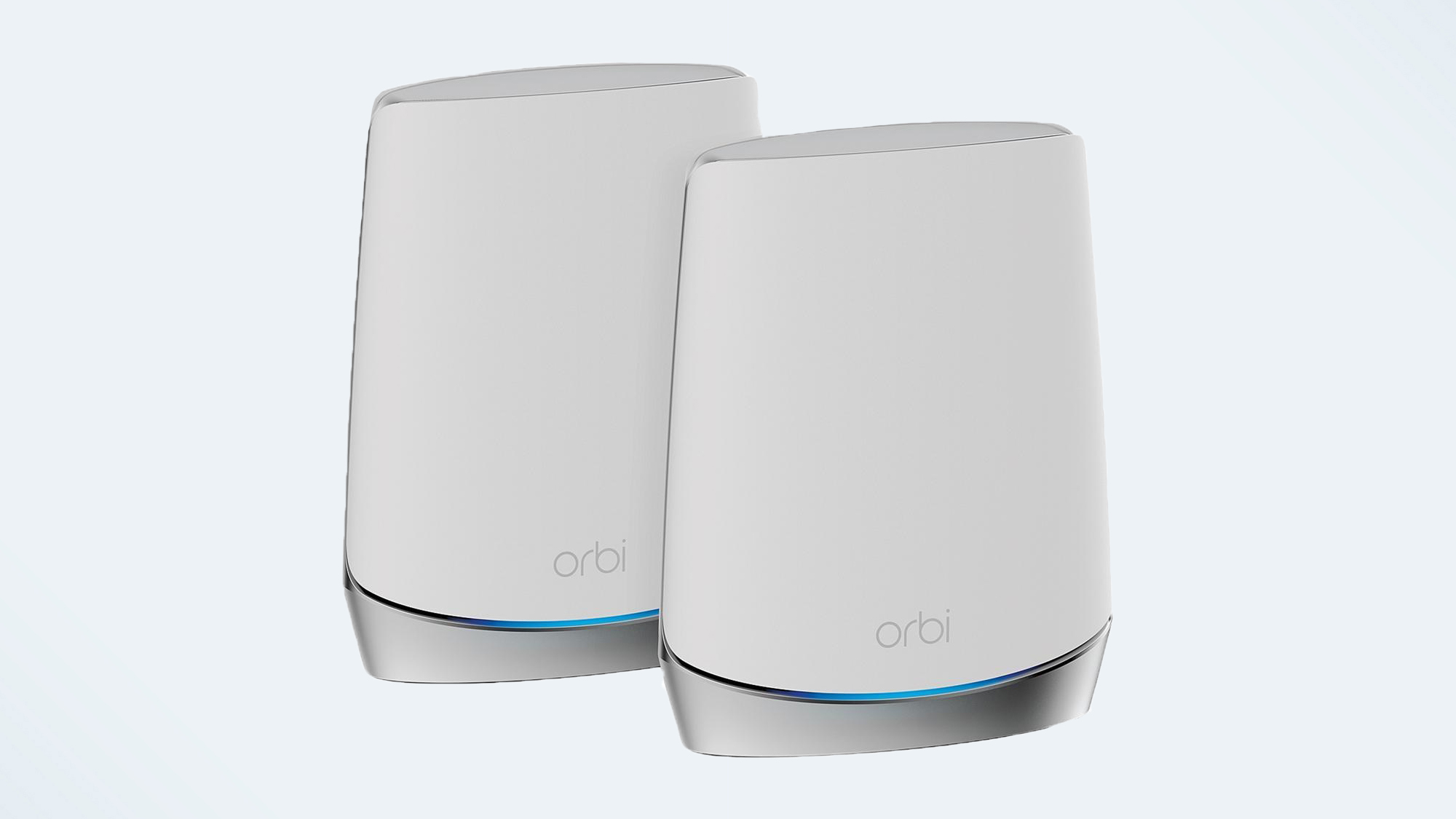
Rather than the RBK852’s array of eight antennas, the RBK752 units have six, reflecting the use of Qualcomm’s Networking Pro 800 Wi-Fi chip instead of the RBK852’s Networking Pro 1200, which offers more data streams. With MU-MIMO and beamforming, the router customizes the signal to match the needs of the connected devices, but it can’t run ultra-wide 160MHz data channels.
Like other Orbi gear, the RBK752 series uses Netgear’s tried and true tri-band design that moves data over 2.4- and 5GHz bands and reserves the second 5GHz band for moving data from the satellites to the host. This dedicated backhaul channel can lower system overhead and streamline operations but ties up more than one-third of the network capacity. Others use a dynamic scheduling system to balance the flow back and forth.
The router has a quad-core 1.4GHz processor, 512MB of RAM and 1GB of storage space for software and settings. In the lab, the set can move up to 600Mbps along its 2.4GHz band as well as 1.2Gbps on its data-supplying 5GHz band. Add in the 2.4Gbps that the dedicated backhaul channel provides and the system has the power to move 4.2Gbps.
The mesh kit’s approach to ports is a mixed bag with the RBR750 router having a WAN input and three wired ports. They all top out at a data flow of 1Gbps and lack the ability to accommodate the latest 2.5Gbps Multi-Gig inputs, but the RBR750 can aggregate a pair of networking ports for up to 2Gbps service, something other mesh kits can’t do.
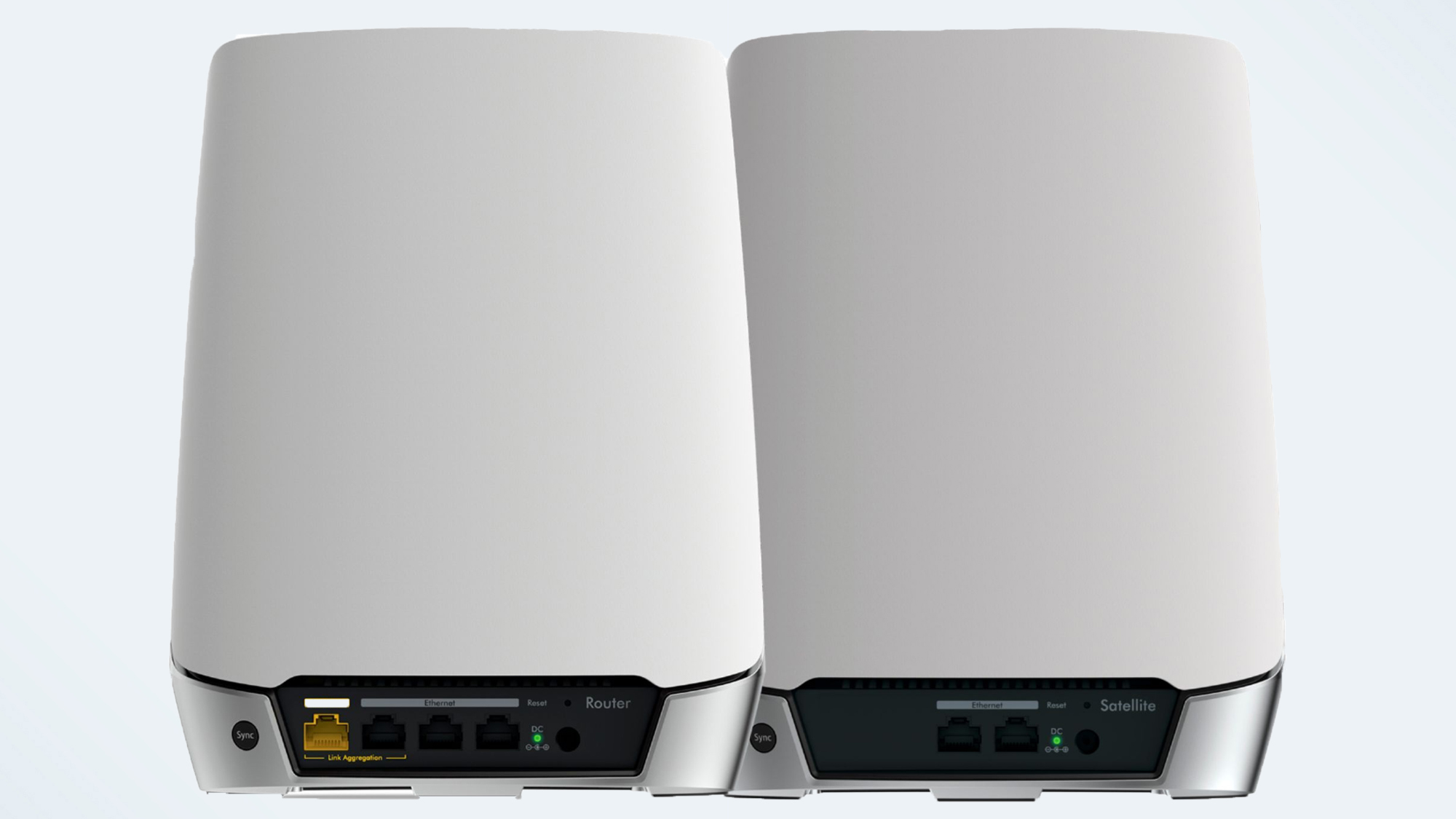
By contrast, the RBS750 satellite has a pair of networking ports. Neither have a USB connection for adding a hard drive as networked storage.
Both devices have a recessed reset button but only the router has a power switch. Finally, the RBK752 kit can use the Wi-Fi Protected Setup scheme for quickly adding devices. The unit’s Sync button is how to activate it. The Eero Pro 6 lacks this feature due to security concerns.
Netgear Orbi RBK752 review: Performance
As was the case with the RBK852, the RBK752 kit started out strong and its performance fell off quickly with distance. Using Ixia’s IxChariot networking benchmark software we created a busy network with 10 simulated users in my 100-year-old, 3,500-square-foot house. Overall, it did well, but couldn’t fill my home with Wi-Fi, although a third device would likely have done the trick.
On its own, the RBR750 router was able to deliver 506.7Mbps at 15-feet to the Dell XPS 15 test system. This roughly tied the Linksys Velop AX4200 (507.7Mbps) and ahead of the Eero Pro 6 (436.1Mbps). None could touch the Netgear Orbi WiFi 6 RBK852 router, however, which moved 833.6Mbps.
With 50-feet separating the test machine from the router, the RBR750’s bandwidth dropped to 100.3Mbps. This is more than enough for most uses but was well behind the Eero Pro 6 (239.9Mbps), the Linksys Velop AX4200 (201.3Mbps) and the Netgear Orbi RBK852 (124.4Mbps).
At 75-feet, the RBK752 moved only 82.5Mbps, just behind the Netgear Orbi RBR852 (85.9Mbps), and well off the pace set by the Eero Pro 6 (208.9Mbps). By contrast, the Linksys Velop AX4200 moved 139.6Mbps. The RBR752 lost contact at 85-feet, the same range as the Netgear Orbi RBR852 and well behind the Eero Pro 6’s 105-feet.
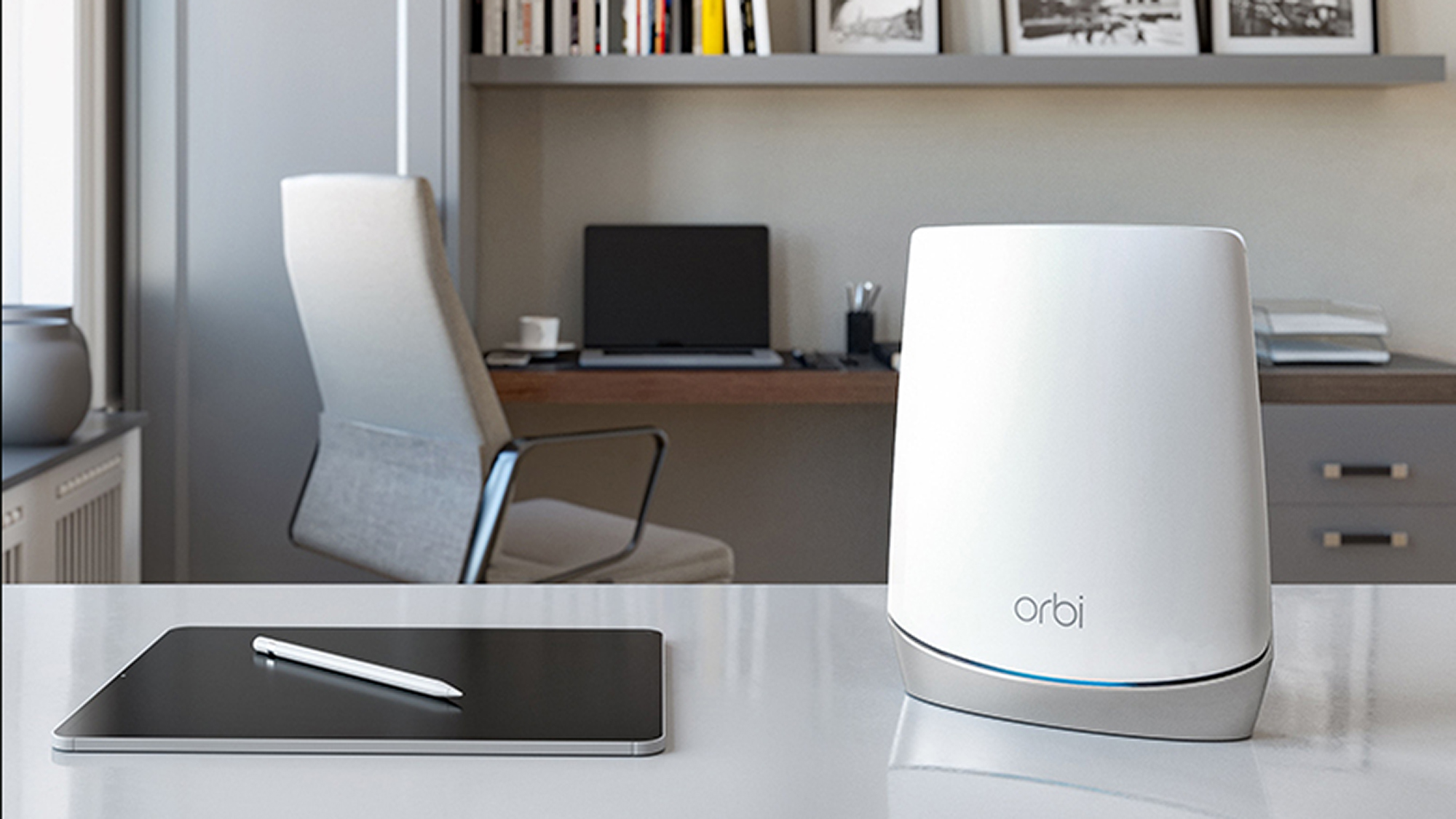
It had trouble competing with other Wi-Fi 6 mesh routers when it came to sending a signal through 25 feet and a wall with 326.6Mbps available on the other side. Under the same conditions, the Netgear Orbi RBR852 moved 782.9Mbps, while the Linksys Velop AX4200 was able to deliver 525.7Mbp and the Eero Pro 6 coming in at 375.6Mbps.
When it came to sending a signal up a floor to a bedroom, the Orbi RBR752 (281.0Mbps) was well behind the RBR852 (670.1Mbps). The Linksys Velop AX4200 and Eero Pro 6 were in a virtual tie at 437.5Mbps and 430.9Mbps of throughput.
With a satellite connected 50-feet from the router on the same floor and the test system another 40-feet away, the RBK752 mesh network came up short with 87.7Mbps of data delivered to the test system. That’s roughly half the Linksys Velop AX4200 (161.1Mbps), although it’s a lot better than the Netgear Orbi RBK852 (39.1Mbps). The Eero Pro 6 kit was in between with 142.3Mbps of bandwidth.
With the satellite a floor above the router and the test system 50-feet away, the throughput it received was 209.4Mbps, or about half the 405.5Mbps that the Orbi RBK852 was capable of. That said, the Linksys Velop AX4200 (329.2Mbps) was impressive, nonetheless.
After using the RBK752 for emails, downloads, music, video and gaming, it did well in my old house, but left a few dead zones. A third unit — like that which comes with the Orbi RBK753 three-pack — would likely have made for a whole-house network. Still, the RBK752 passed our saturation test by streaming high-quality video on my Macbook air while I had Spotify playing music on an Apple iPad Pro tablet and a Lenovo ThinkPad T470 was playing an Internet radio station. All this was going on while an HP Dragonfly Elite notebook moved data onto and off of a network-attached RAID storage system. There were no drop-outs, artifacts or glitches with the audio or video streams.
Both the router and satellite used 8.6 watts of power. If the network is left on 24/7, it should cost roughly $9.80 for each unit for a total of $19.60 a year, assuming the gear is always on and you pay the national average of 13 cents per kilowatt hour of electricity. That’s about $5 less than the RBK852’s $24.40 a year in power costs but about $15 less a year than running the Arris SURFboard Max two-piece kit.
Netgear Orbi RBK752 review: Setup
The Orbi RBK752 kit follows in the footsteps of earlier mesh products with an easy setup procedure. You have the choice of using the Orbi app (available for Androids and iOS devices) or using a connected browser. I set my kit up using my Samsung Tab S7+ tablet and did some configuration using the browser approach.
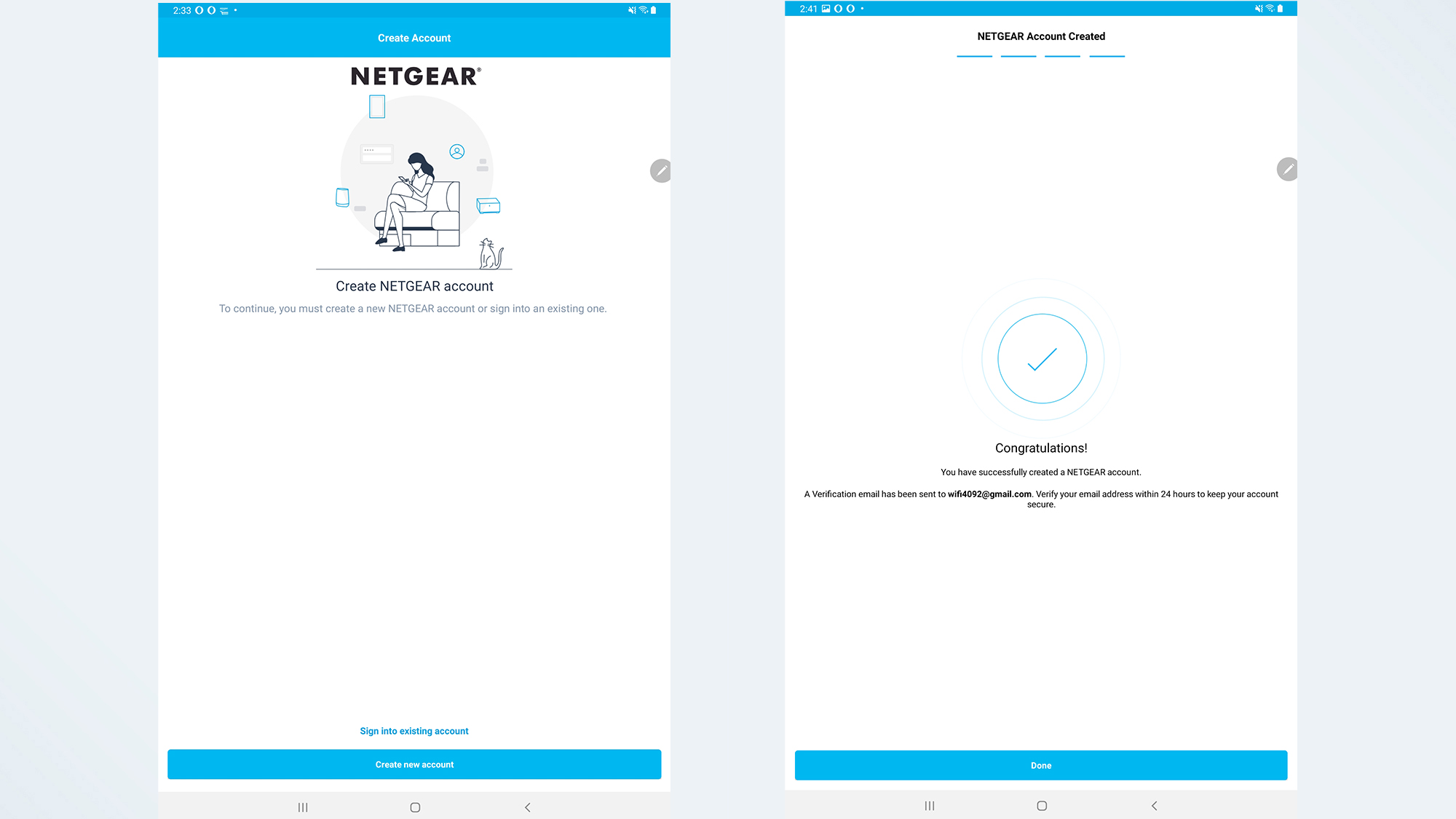
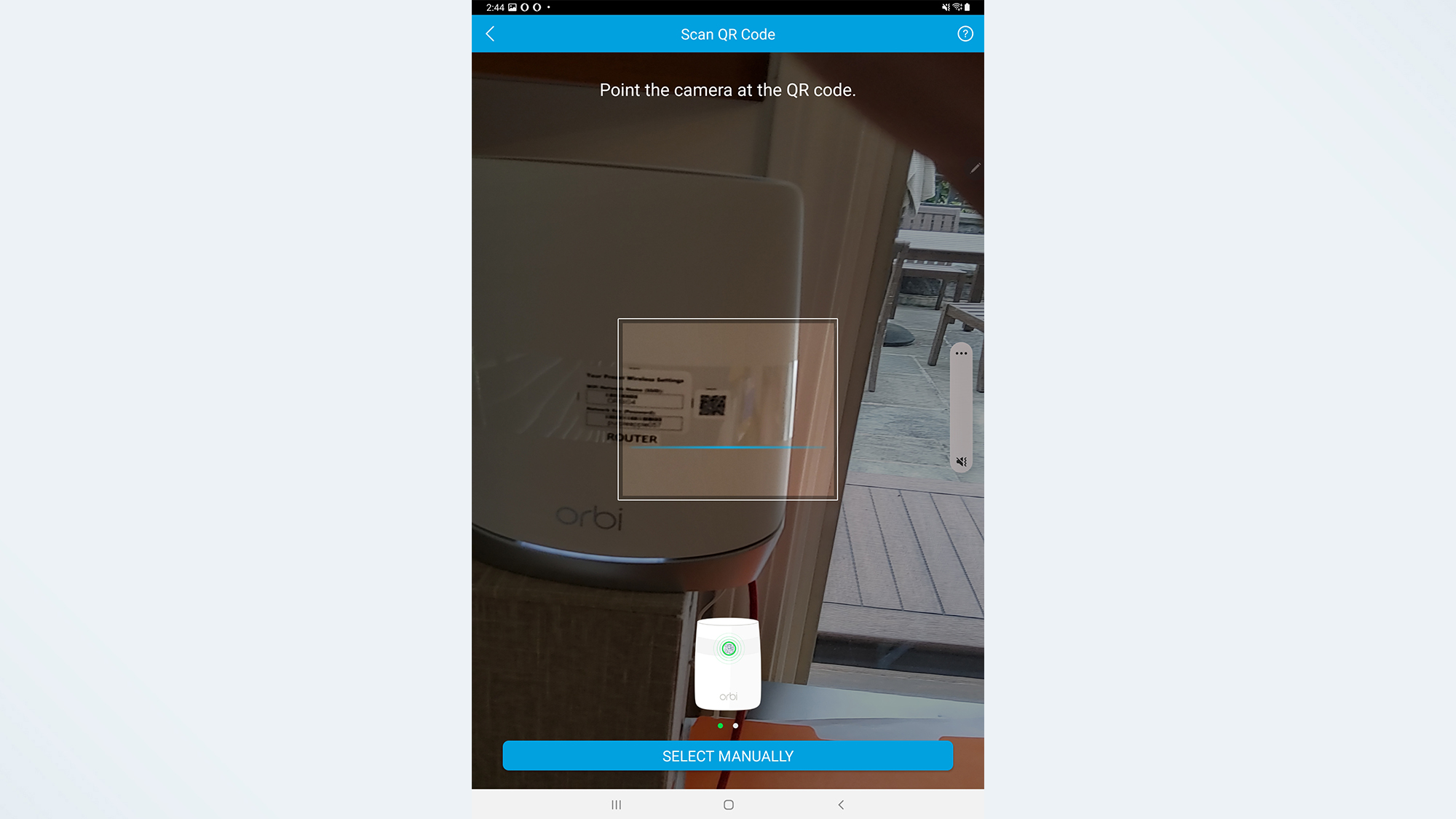
I started by creating an account with Netgear that included an email verification. Once done, I scanned the QR code on the router’s plastic identification sleeve to reset my tablet’s network connection.
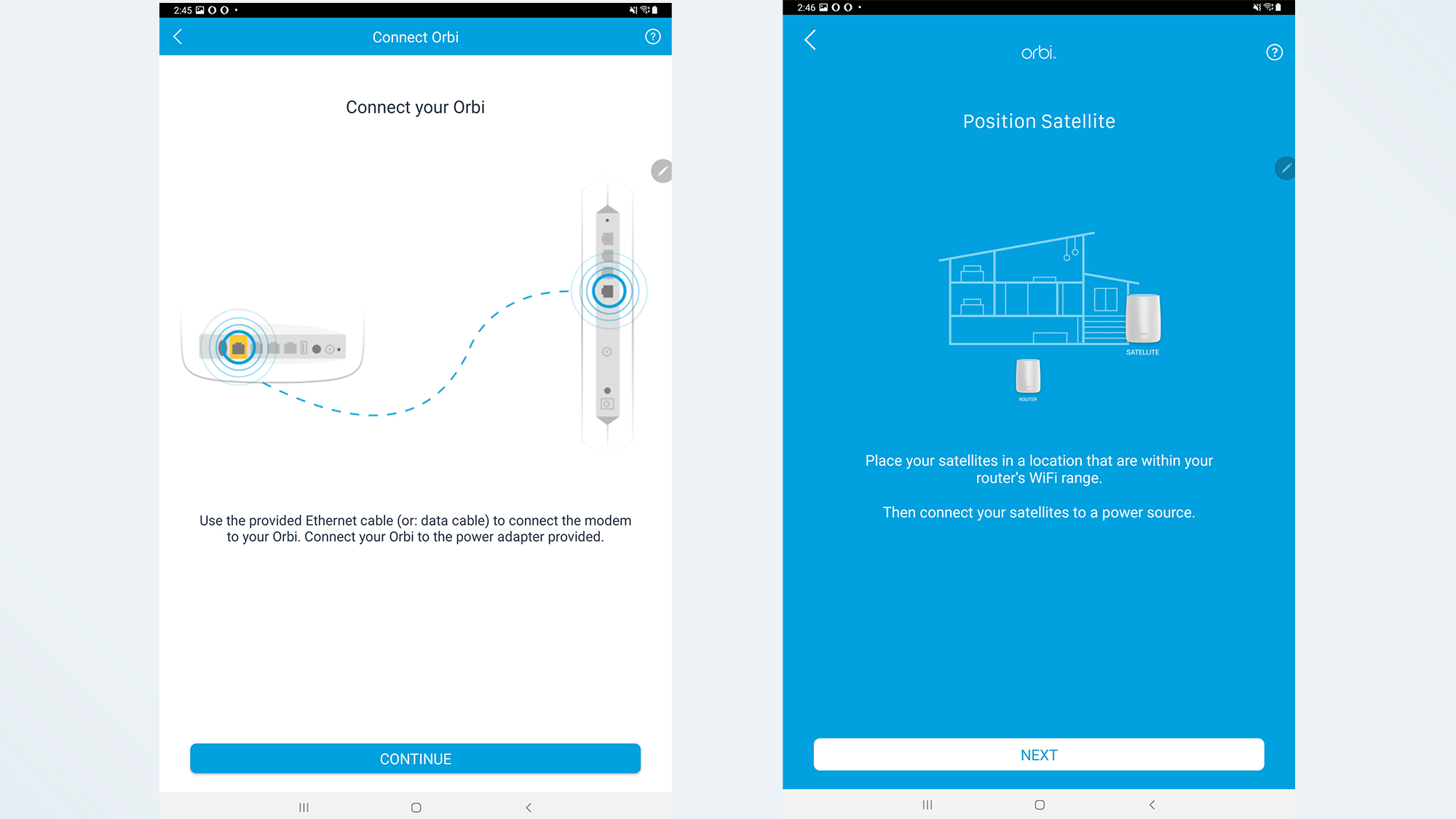
After restarting the data modem, I plugged everything in and followed the illustrations. I set the satellite device 50 feet away from the router and plugged it in.
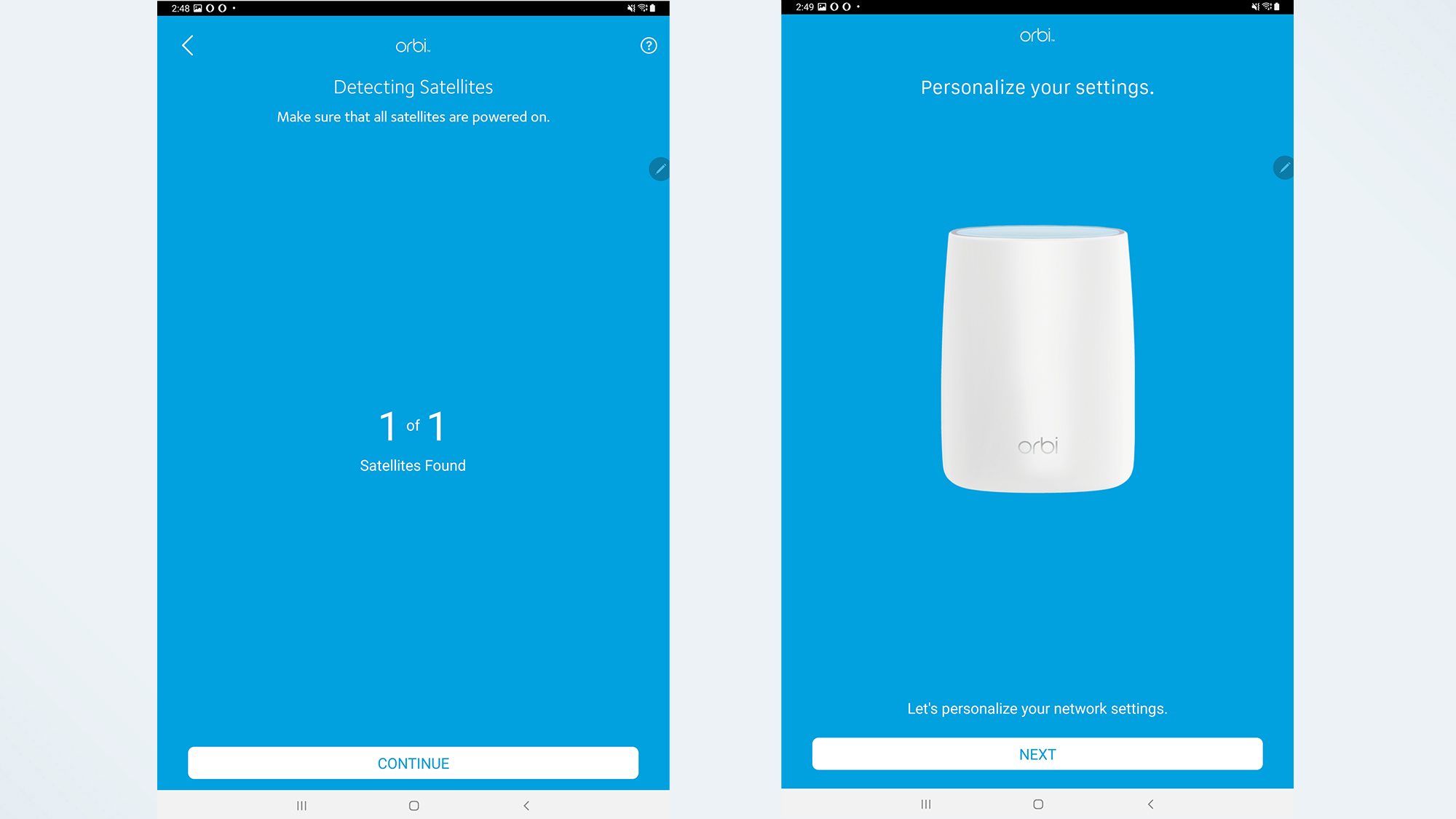
Following a brief scan, it found the satellite and the network then configured itself. While this was going on, it displayed a slide show about the Armor security software. Next up, I typed in the name and password for my new network.
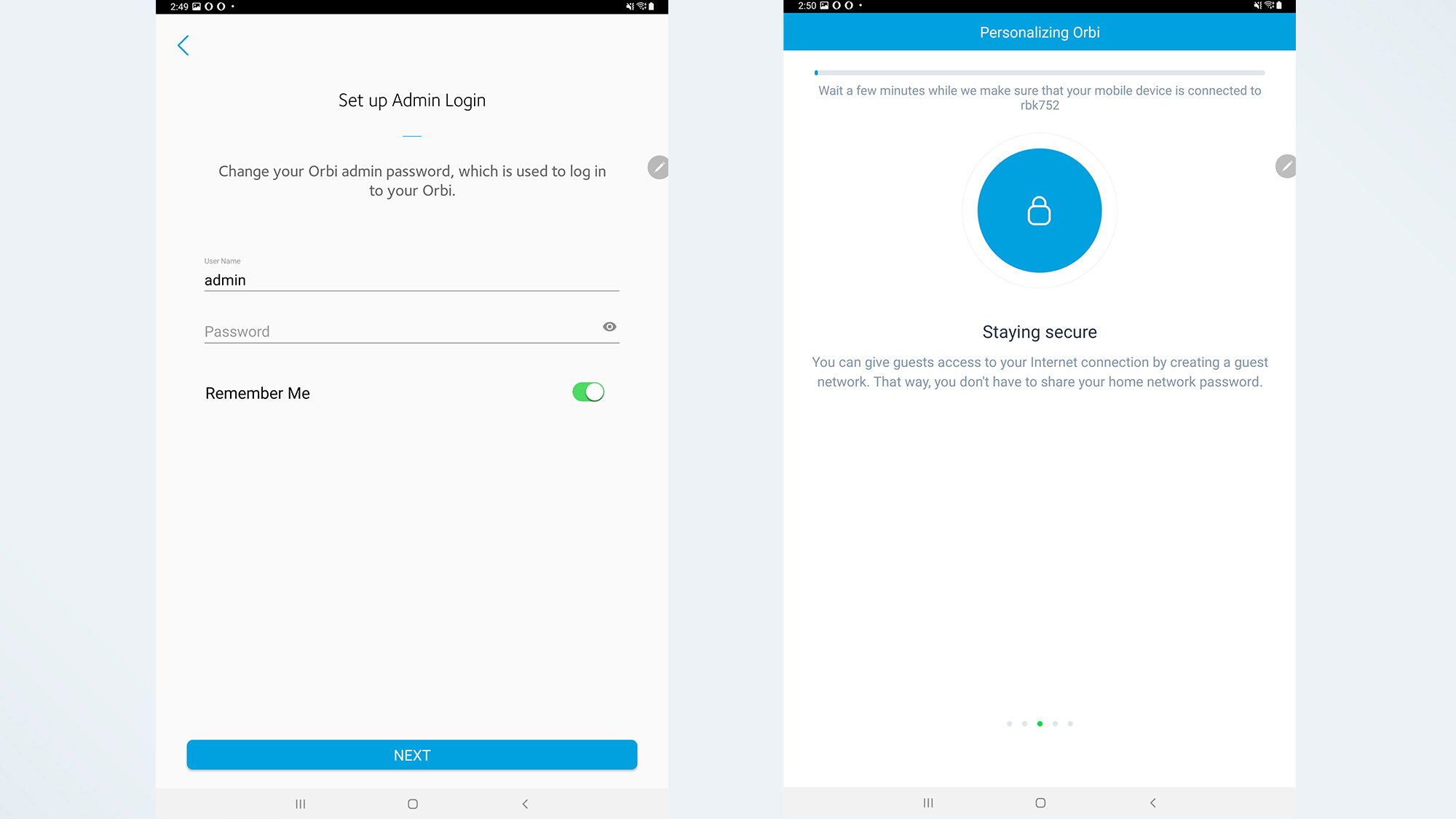
Next, I inputted a new administrative password and the answers to two verification questions. The system then finished its initial configuration and connected the router to the satellite.
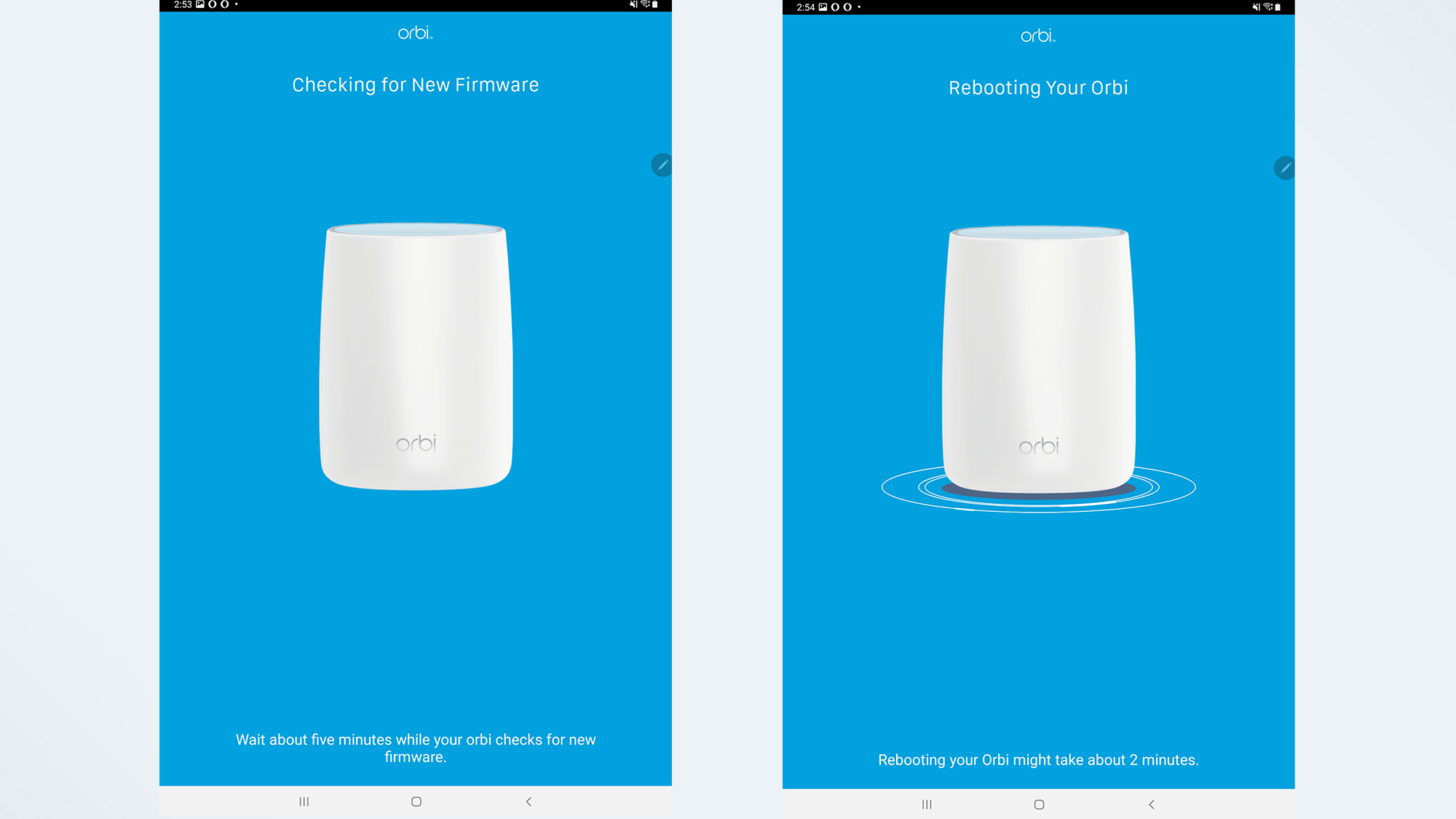
The software then checked for new firmware and automatically upgraded it. After the system restarted, both the router and satellite connected on the first try.
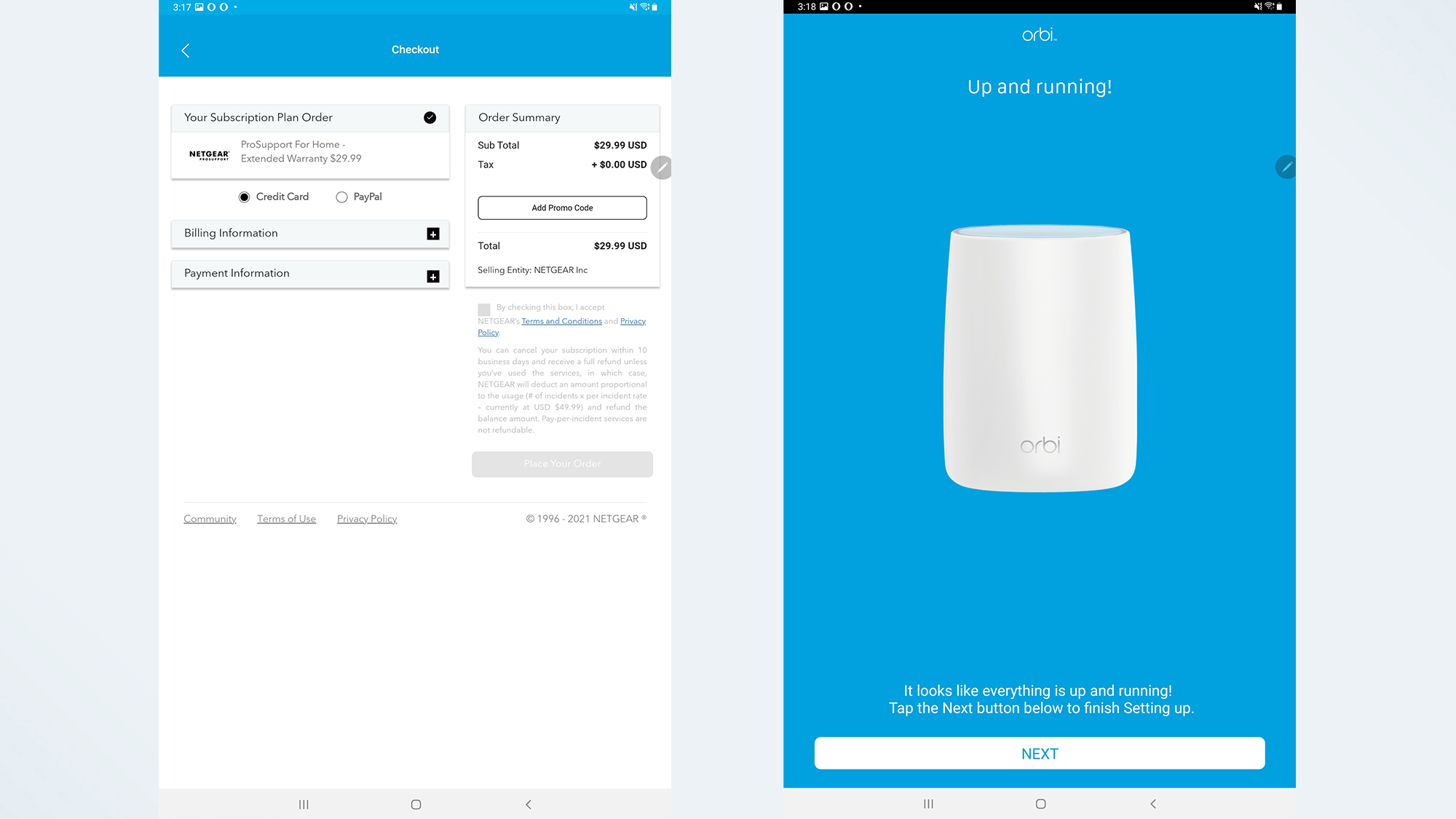
Not quite done, though, because Netgear only includes 90 days of support. The setup routine offers a two year warranty extension for $30 and two years of added support for $80. All told, it might have been one of the easiest set up routines but it took 17 minutes to complete the two-piece mesh network versus 11 minutes for the Eero Pro 6 three piece set.
Netgear Orbi RBK752 review: Configuration
The configuration and customization of the Orbi RBK752 mirrors that of its cousin, the RBK852, with the ability to use the app or a connected browser. On the other hand, the app affords fewer configuration opportunities compared to using a connected browser. The app’s main page puts everything in your face with the online status, how many satellites are connected and links to vital operating parameters like what devices are connected and the Armor security software status.
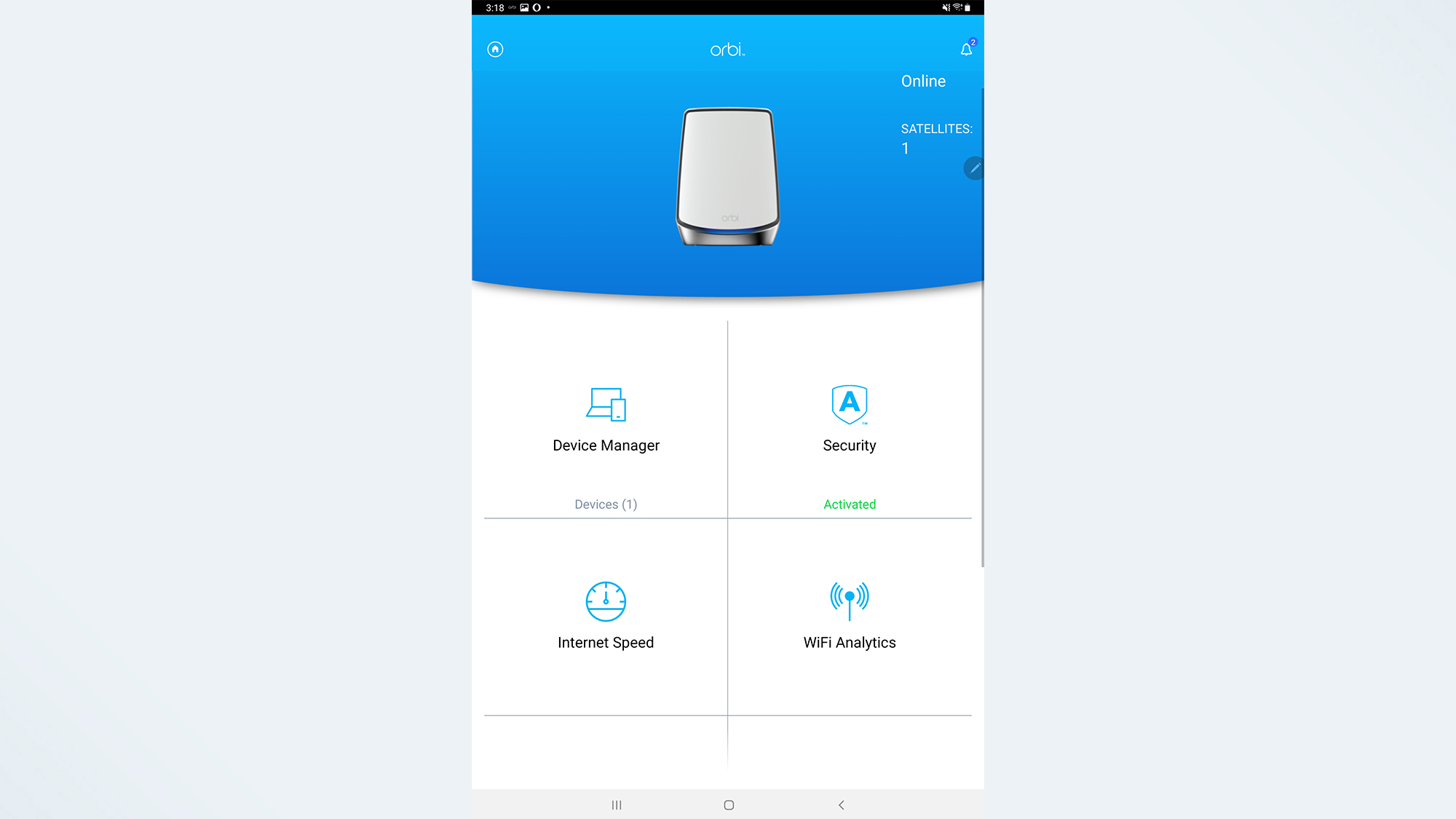
If you want to do a deep dive on the Orbi RBK752, use a browser that is connected to the router. The Basic section includes much of what the app has, with a good overview page as well as the ability to change the network’s name and password. It has options for turning 802.11ax transmissions off and looking at the details of individual connected devices or setting up the Guest Network. At any time, it allows adding another satellite.
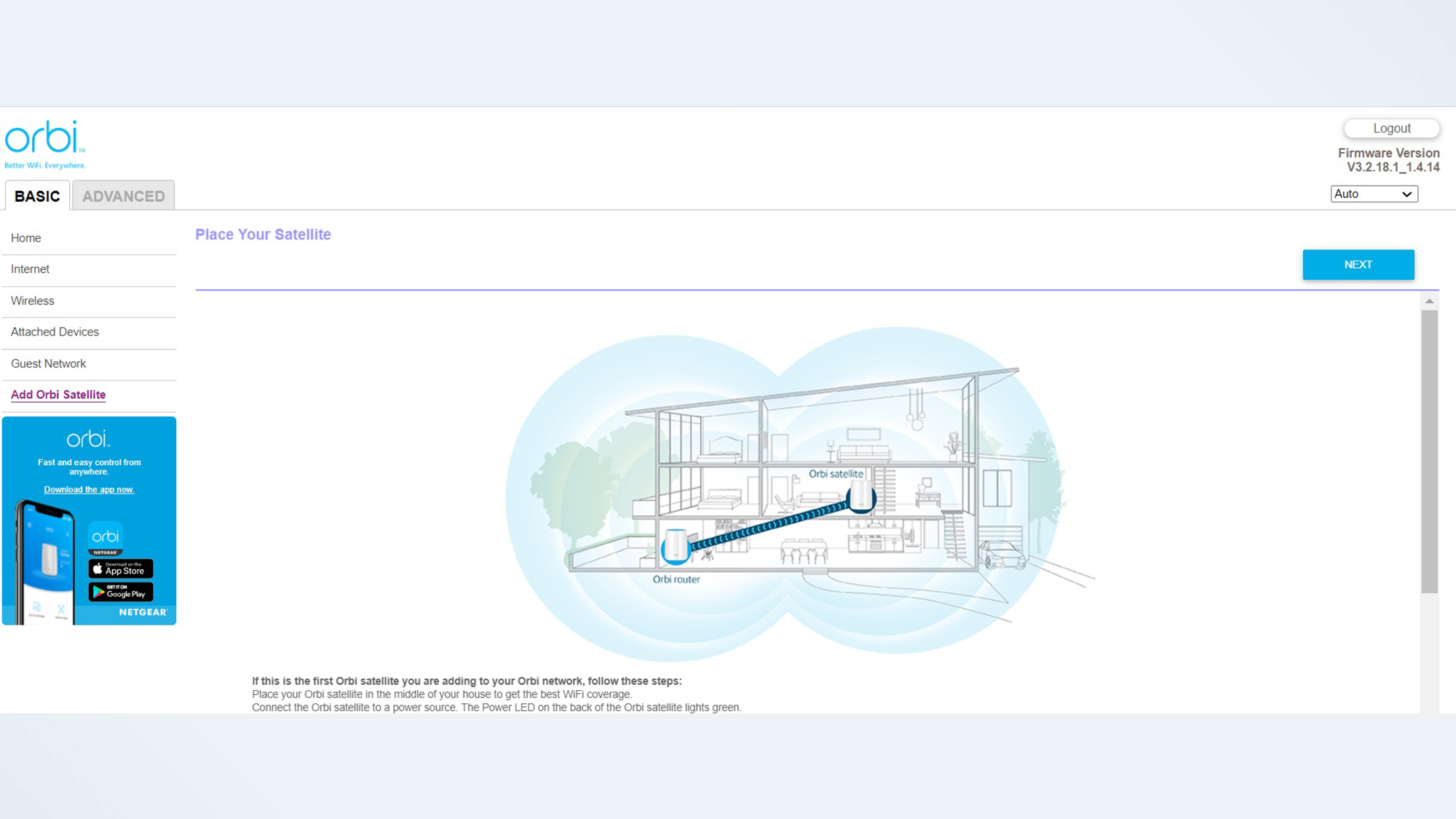
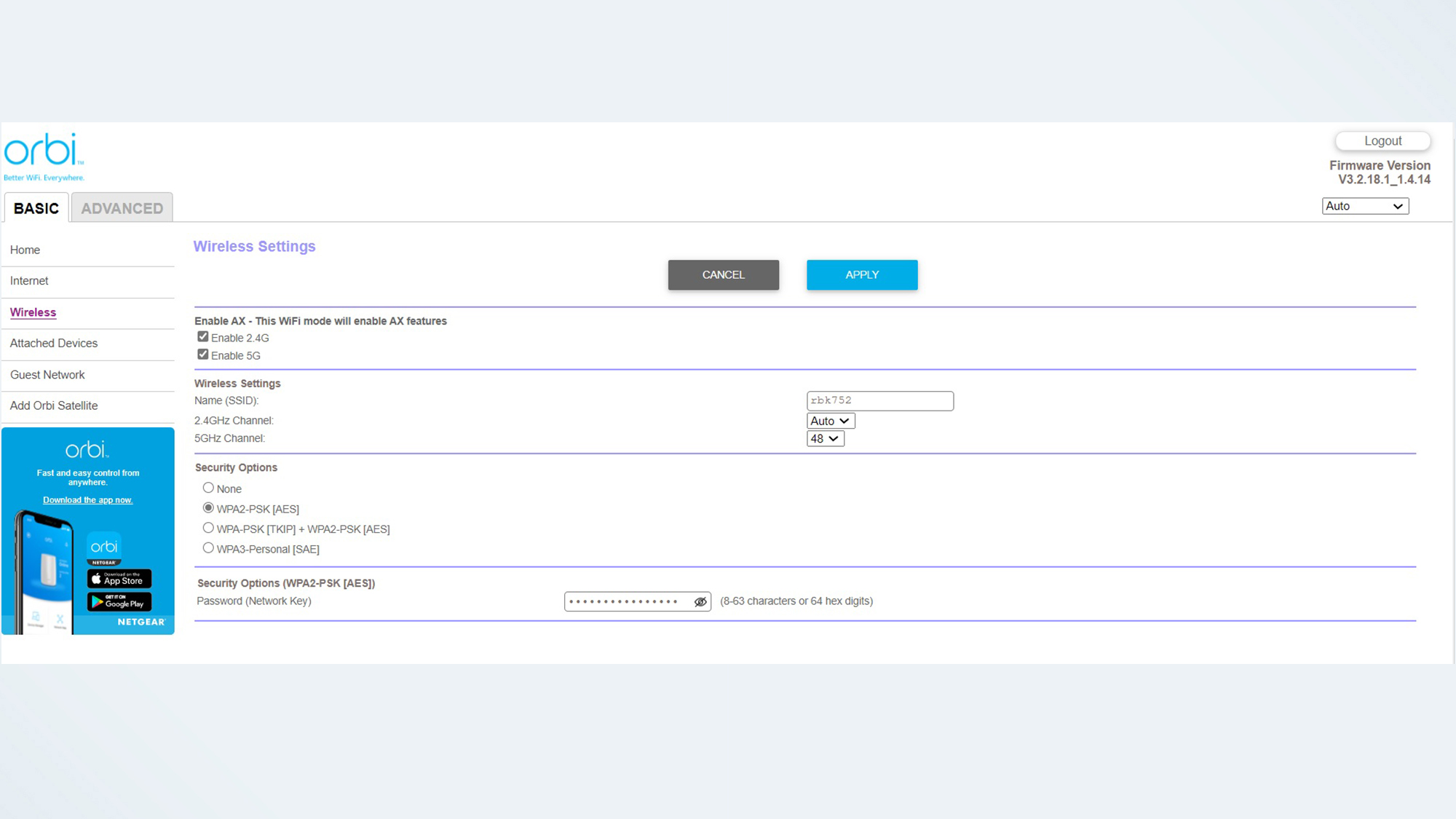
The mesh network’s Advanced section is where all the customization power is. In addition to in-depth usage stats and the ability to reboot the system, the page has a lot of configuration data. Click on Wireless Setup to adjust the channels that the system uses or change the password. The Access Control category let me block computers from logging on or block online services, while the Schedule task let me turn off Internet access at a time of my choosing.
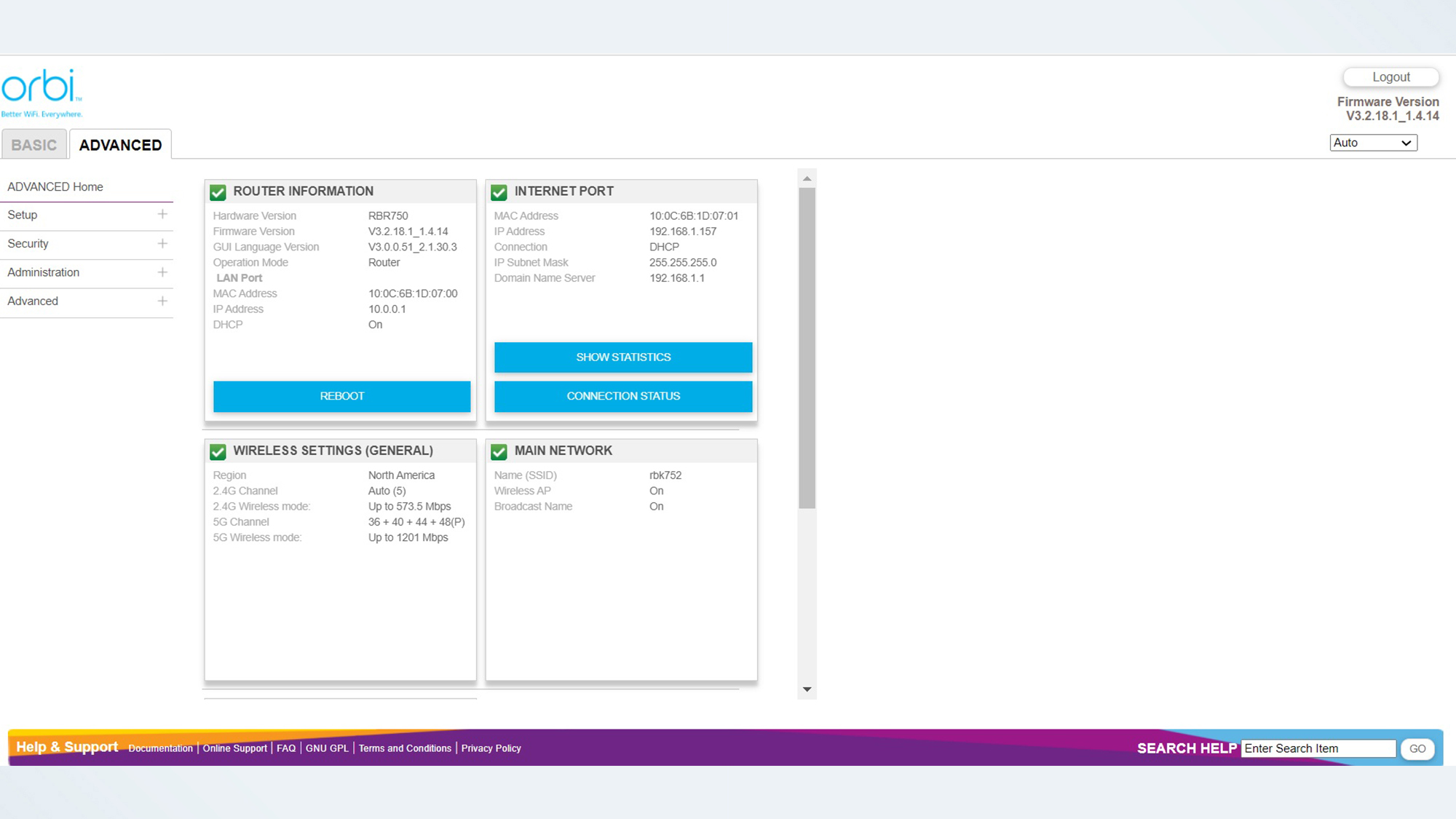
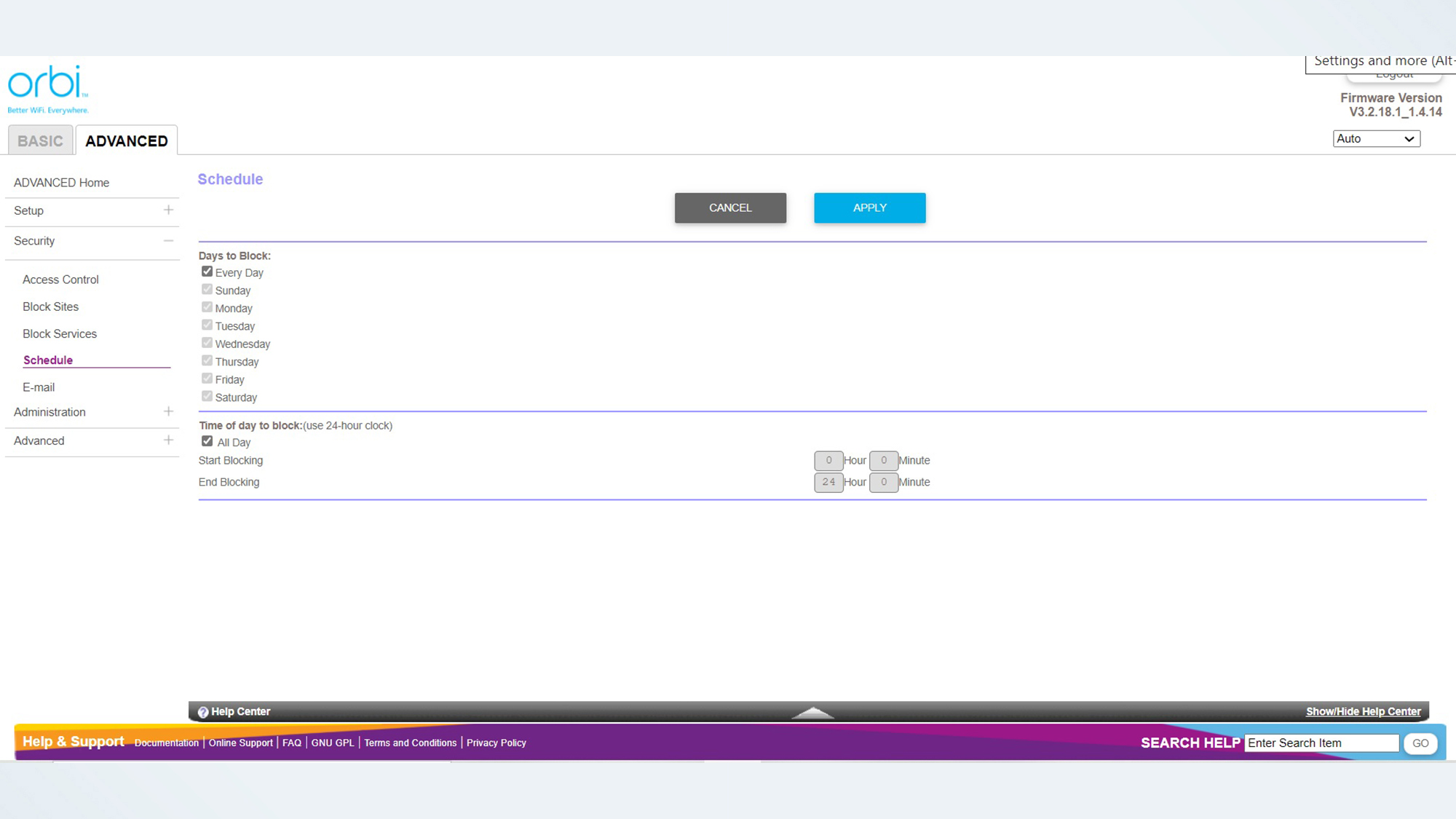
On the downside, Orbi’s Quality of Service (QOS) prioritization remains tied to the company’s Wi-Fi Multimedia (WMM) settings. It gets activated in the Advanced section’s Wireless Settings sections to automatically prioritize the devices that need the most data.
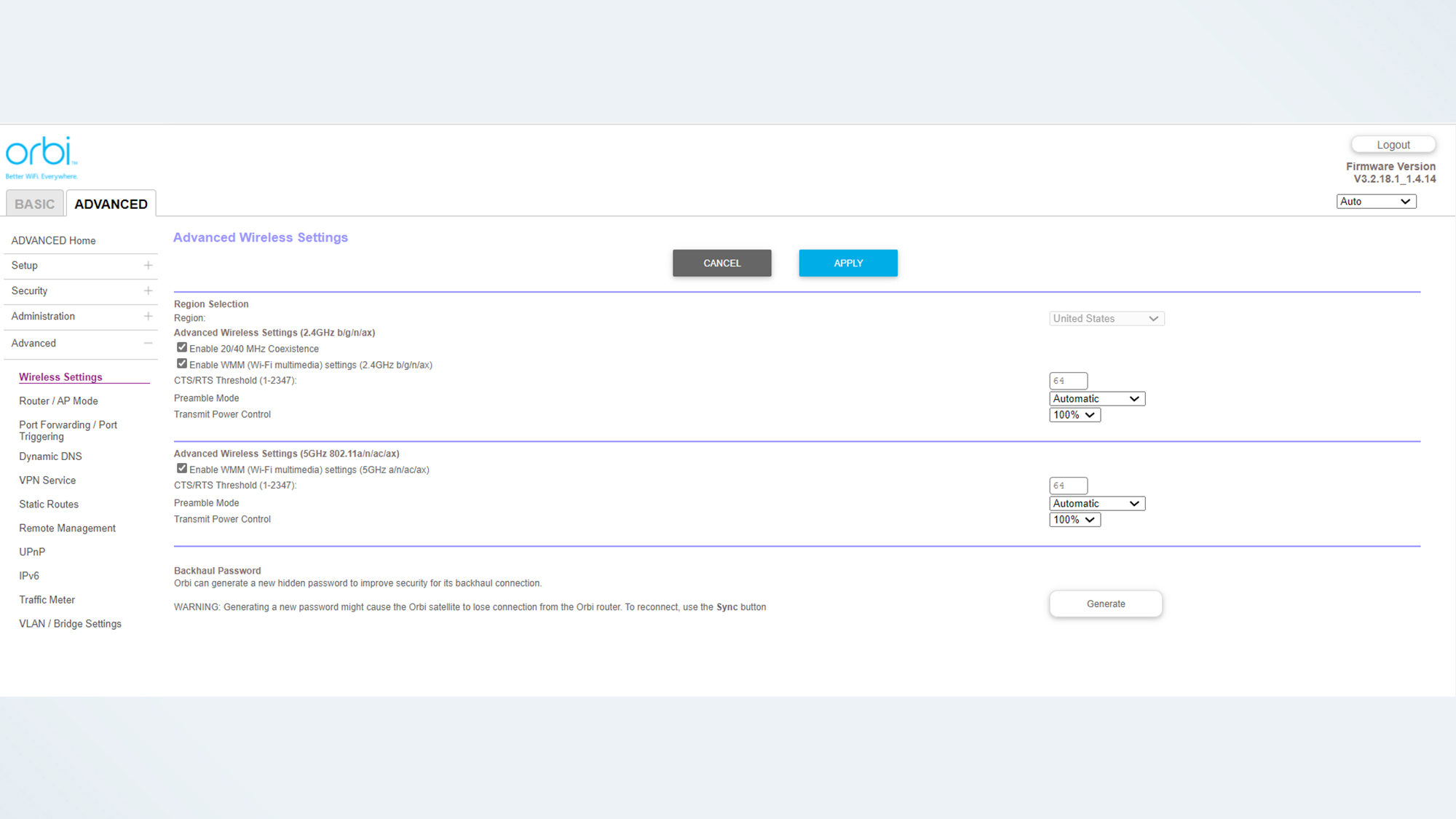
The Advanced section has its own Advanced portion (Advanced squared?) where the real customization can take place. Here, I was able to do anything from reducing the transmission’s strength to changing the preamble length. It has one more trick up its sleeve: the ability to add another layer of security by protecting the backhaul communications with an additional password. It took less than a minute to set up.
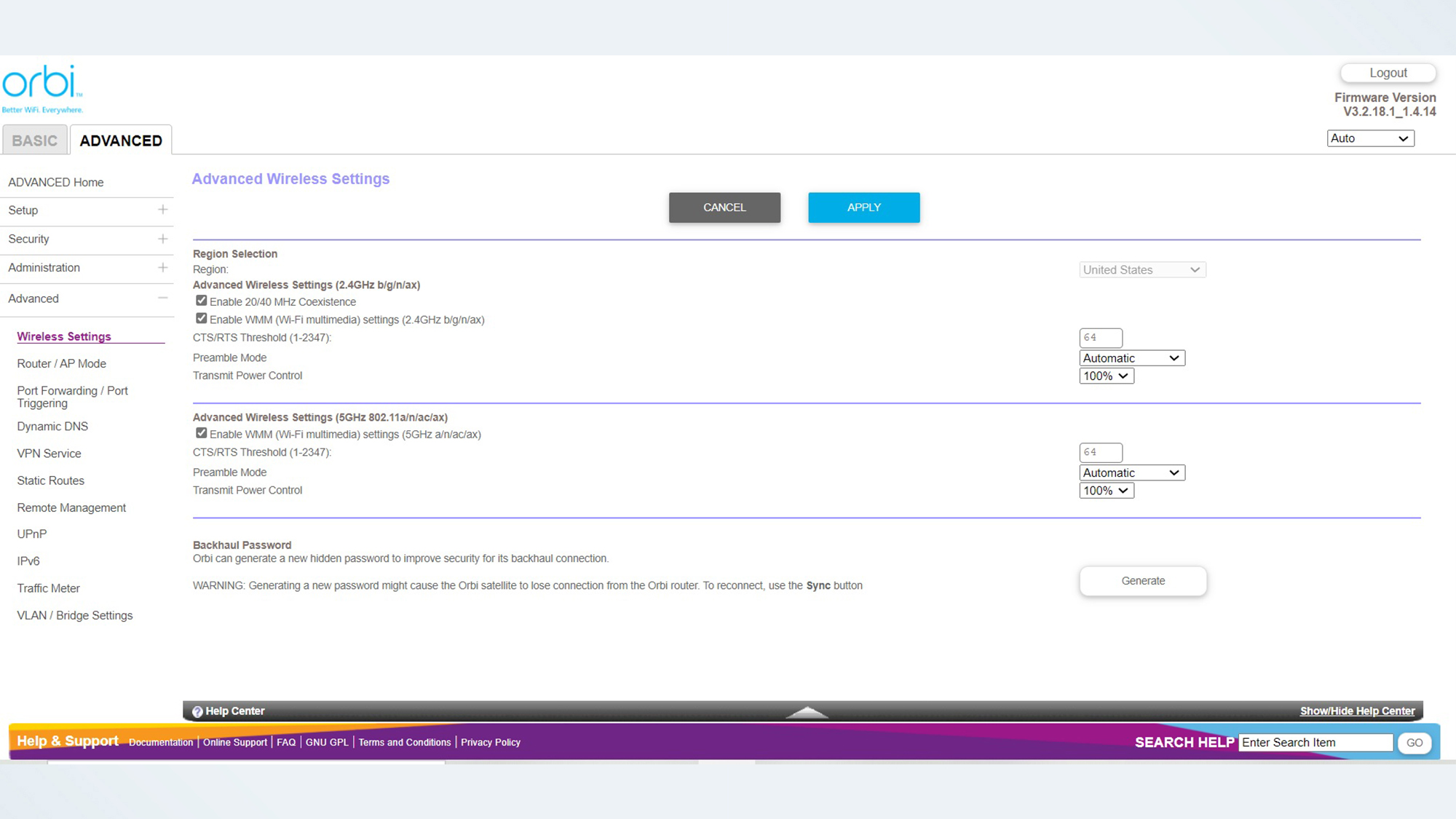
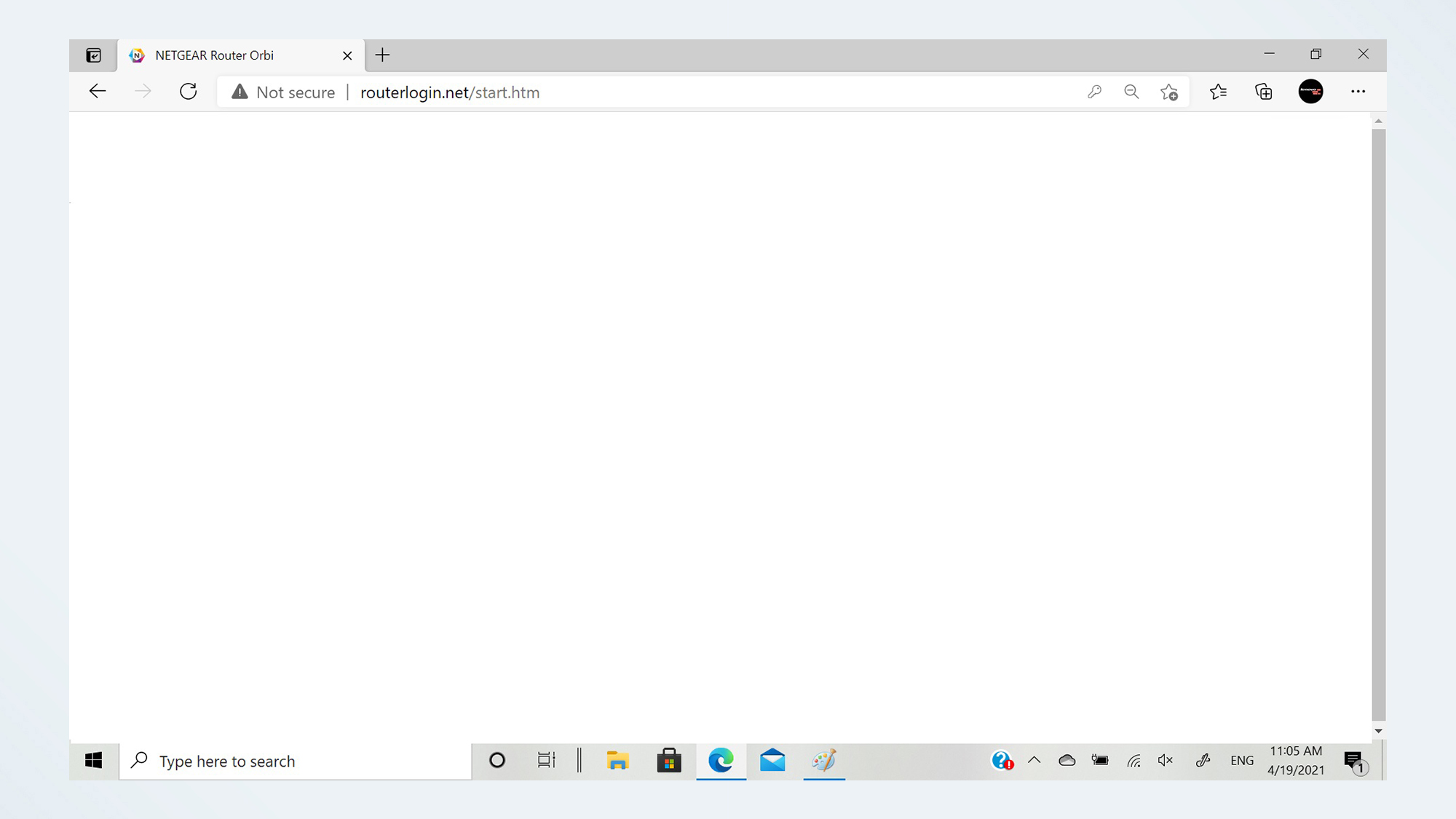
Like other Orbi products, the RBK752 kit includes Netgear’s Armor security program. Based on apps from Bitdefender, the system can help keep the connected computers and the network itself squeaky clean. There are apps for Windows, Macs, Androids, iPhones or iPads. On the downside, 30-days of updates are included – after that it costs $70 a year.
While Netgear’s one-year warranty is on a par with Eero’s, it is well behind the three years of coverage that Linksys provides. Plus, Netgear only provides 90-days of support and service. Others include at least a full year. Netgear uses this as an upsell opportunity with two years of support, service and warranty protection for $80; on its own, two years of support costs $30.
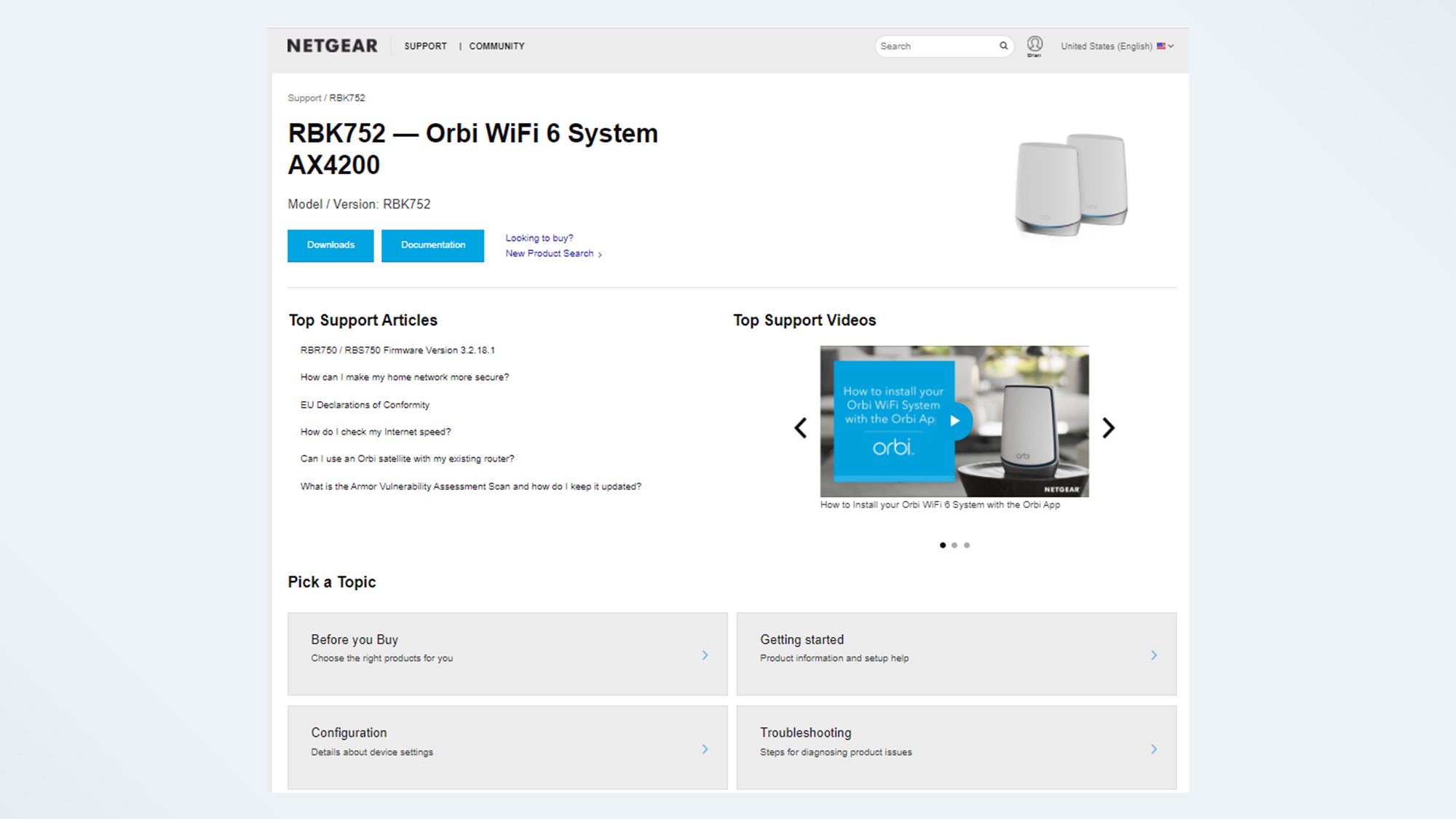
Regardless of whether you pay for support, Netgear has a wide array of do-it-yourself options online. They range from how-to videos and FAQs to optimization and troubleshooting tips.
Netgear Orbi RBK752 review: Verdict
They may be big, expensive and not the fastest mesh products available but the Netgear Orbi RBK752 appeals to both those want a turn-key mesh solution that requires little or no customization, as well as those who revel in adjusting the network’s operating parameters. It runs Netgear’s dependable 5GHz dedicated backhaul channel for data flowing from the satellite to the host and includes the company’s Armor security software so the network and its clients should remain clean and hacker-free. That is, if you subscribe to Netgear’s updates to the software, which cost $30 for two years or $80 with a two-year warranty. Unfortunately, as is the case with its bigger cousin, seen in our Netgear Orbi RBK852 review, the RBK752 suffers from short range and many homes will need a second satellite for adequate coverage.
The Netgear Orbi RBK752 may be cheaper than the more premium Netgear Orbi WiFi 6 (RBK852), and it's a little less expensive than the three-piece Linksys Velop AXE4200, but the slightly cheaper Linksys offers better range and better coverage for larger homes. In the final analysis, the Netgear Orbi RBK752 is a great way to turn a mid-sized house into a Wi-Fi 6 home.
Brian Nadel is a freelance writer and editor who specializes in technology reporting and reviewing. He works out of the suburban New York City area and has covered topics from nuclear power plants and Wi-Fi routers to cars and tablets. The former editor-in-chief of Mobile Computing and Communications, Nadel is the recipient of the TransPacific Writing Award.
-
murraycollingwood I had previously bought a pair of Orbi RB50 s, and they were brilliant, still are.Reply
So when I wanted to upgrade our office wireless I went straight to the Orbi RBK750s. A base station and 3 satellites should do it.
The base station included the router, so we tried to connect this directly to the NBN with iiNet, and it worked, sort of. Every day the internet connection would be dropping - the wifi seemed to be working fine, but the router connection to the internet continued to drop out.
Simple, we roll back to the old router and just use the Orbi's for the wifi. (And we disabled the wifi in the original router).
This seemed better, but then at completely random times the Orbi wifi connections would drop. The base station was always okay, but the satellites kept dropping connections, so our zoom calls were interrupted, connections to online systems had to be restarted. There was no obvious reason, no change in traffic or movement of wireless devices, nothing we could see that was causing these drop outs.
Today I had about 4 dropouts within the space of an hour (none before and none since) but it's simply not acceptable.
The units seem to recover quickly, so the connection might only be lost for 5-10 seconds, but for online calls that can be fatal.
We're on the latest FW, and all of the Orbi's are on the same version of FW.
We did hard reset everything, turning on each unit independently, waiting for each to connect in turn, still no difference.
I'm taking them back to the shop for a refund. Won't be buying any more Orbi's for a while.
As an IT specialist I'm going to take a stab and guess that the FW is buggy, and something somewhere is triggering the FW to crash. Inside the unit there is probably some facility that restarts the FW after it crashes, so the device is rebooting each time this happens, which is why it comes back reasonably quickly.
So, while the speed is good and the design is nice, and the setup is simple, the cost is high, and the reliability is ZERO !
